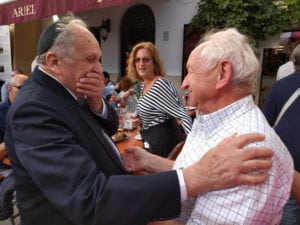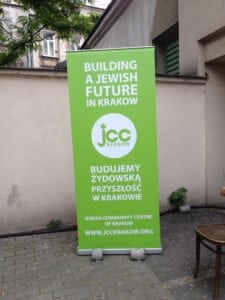
Two Holocaust survivors who were at Buchenwald concentration camp together met for the first time since the war this summer during an international Jewish music festival in Krakow, Poland. (photos provided by Rabbi Beth Jacowitz Chottiner)
For many Jews, Poland is something of an enigma, a study of contrasts.
The 120,000-square-mile country was once home to the largest Jewish community in Europe – about 3 million before the war. No one knows how many live there today, but the number is small, mostly in Warsaw and Krakow. In many towns and villages, Jewish life has vanished.
Not that Jewish life is gone there. Since the fall of the Iron Curtain, many Poles have discovered that they have Jewish roots; some have even embraced their forgotten faith. JCCs have opened in Warsaw and in Krakow, where an international Jewish music festival attracts thousands every year.
Still, between the Holocaust, the rise of communism and the country’s deeply rooted anti-Semitism, Poland remains for many a graveyard for Jews.
Why then do Jews, including Louisville Jews, choose to visit this land?
This year, several area Jews journeyed to Poland for many reasons – family trips, conferences, seminars. For almost all of them, though, the Holocaust was the underlying reason.
More than a few have come back changed.
Rabbi Beth Jacowitz Chottiner of Temple Shalom went to Poland this summer with Classrooms Without Borders (Temple Shalom President Keiron O’Connell and his wife, Paula, also made the trip.). She still winces when she recalls her first trip to the country.
“I was there for a week and couldn’t wait to leave,” she said. “Every time I passed an older person, I couldn’t help but think, what were you doing during the war?”
This summer marked her third visit to Poland, and a change of heart.
“I wanted to see the Holocaust sites because I felt as a Jew, it was a responsibility and obligation I had. We had a member of our congregation who was actually a Holocaust survivor (Ann Klein), so I think people grew up, and attend our synagogue knowing Ann survived Auschwitz.”
“Unless you’ve been there, you won’t fully understand what I’m talking about,” Jacowitz Chottiner said. “We got home last month, I asked people [who traveled with me] how they were doing, and people said they were still really struggling.
“The more people can experience that, the better for all humanity,” she added. “We are all children of one God.”
(Jacowitz Chottiner is married to the interim editor of this paper.)
Jordan Gould, 17, a senior at duPont Manual High School this past year, visited Poland over the summer, with his father, David Gould, along with relatives and friends.
The trip surprised them both.
“My expectations were not high,” Jordan said, “but you go there and it’s a different feeling.”
David, his father, said the death camps deeply affected him.
“Visiting Auschwitz and Birkenau, I got exactly what I expected; actually, it was more emotional than I thought,” he said.
As for the rest of Poland, “I got nothing like what I expected,” he said. “I thought it would be cold, and it was the total opposite. Now we’re bringing back our story and talking to people. My parents are in their 70’s. When we came back and told them our experience – their generation still equates Poland as turning their back on the Jewish people – maybe my parents will now decide to go to visit and have the same experience.”
Michal Kofman, a University of Louisville sociology professor, has visited Poland many times, including this summer for a conference in Wroclaw.
She said her trips there have taught her a valuable lesson: let go of hate.
“One of the lessons of the Holocaust is that it is not us against them, and they are not out to kill us,” she said.
An Israeli whose grandmother was born in Poland, Kofman noted that many non-Jewish Poles were also killed by the Germans – about three million, according to some sources.
“I know it’s difficult to walk the streets of Poland, look at people and wonder what their family was doing during the war,” Kofman said, “but they suffered a lot. They were also occupied in addition to the Jewish people.
“I think the healthiest way to deal with the Holocaust is to say, yes, it happened, and face it,” she added. “But we are moving on from it, moving on as a community, with reconciliation with the Polish people. That doesn’t mean you have to forget it or dismiss your anger. It means you can move on and create something that is valuable.”
Dan Penner, a Holocaust studies instructor at Atherton High School and Bellarmine University, also made the trip this year with two Louisville Holocaust teachers.
They led a group of 19 students from Atherton, duPont Manual and Central high schools on an 11-day tour of Holocaust sites in Poland, Germany and the Czech Republic. Two of the students they took, were Jewish.
“Most of the kids had taken our class or were about to take it,” Penner said, “so they had a pretty good Holocaust background.”
Still, that did not prepare them for Auschwitz-Birkenau.
“You can talk about it, but it’s just so real [when you’re there]; it’s life impacting.”
One girl in the group was so disturbed by what she saw at Auschwitz that she couldn’t bring herself to visit Birkenau. “She stayed on the bus,” Penner said. “That was her choice.”
It was Penner’s third visit to Poland, but his first leading a student group. He hopes to lead another in two years.
After the Auschwitz visit, the teachers went around the bus asking their students to throw out words to describe what they were feeling “The kids had all sorts of responses, how emotionally draining it was,” Penner said. “My word was ‘honored.’”
He chose that word, he said, because teaching the Holocaust “is relevant and necessary,” especially these days. “You can compare it to what happened in Charlottesville to make that crystal clear,” he said.



